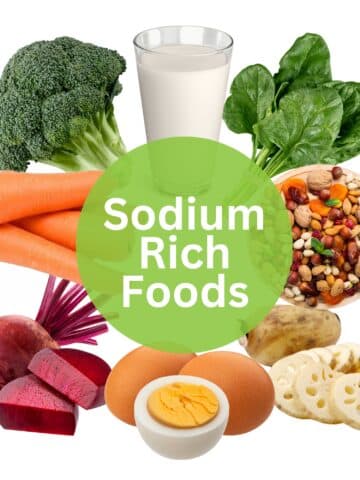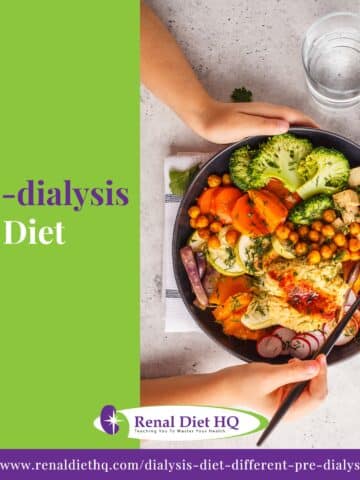RDHQ Podcast 109: 3 Ways Inflammation Is Affecting Your Kidneys (Maybe You Don't Even Know It's Happening!)
Podcast: Play in new window | Download
Hello! Hey, it's Mathea Ford with Renal Diet HQ. Today, I want to talk about three ways that inflammation is affecting your kidneys and you might not even know it.
So, I hope you're having a great day. A great Tuesday it is and I hope you've all been well and I'm sorry that I haven't been around much we've been really super busy.
And I wanted to come to you today and talk about inflammation in your diet and in your body because it's a really important part of healing from kidney disease and delaying the progression of kidney disease inflammation in your body can affect you whether you're pre-dialysis or if you're on dialysis. Even if you're on dialysis, you can decrease the amount of inflammation that's in your body that will help you to heal better to feel better to have a lot of just improvement in fatigue and other things so I want to talk about what is inflammation right now.
So, inflammation in your body is probably you can think of it as a strain on your system it is your body trying to react to some sort of aggression against it so to speak. So, if you think about it it's like if you get a puncture wound if you get a little you know a bee sting or a puncture wound then what happens you get redness, you get swelling, you know, hopefully, you don't get a reaction but if you do you get heat, you get pain, you have an inflammation point like in one little spot on your body so having that inflammation point you can understand what that means and that is called Acute Inflammation.
So, when you have something happen - you have a cut, you have a scrape, whatever, you have that acutely happen and then that becomes a source where your body sends all these antibodies and all these repairing and clotting factors everything to stop that inflammation. It gets, it gives you some inflammation at that moment but it gets you to stop that intrusion on your body. It sees it as a strain on the system, it sees it as an intrusion. So, think about that as something that's acute.
But there are two kinds of inflammation you can also have an inflammation that is chronic and that's what happens a lot of times with chronic kidney disease is you have some chronic sources of inflammation.
So, chronic inflammation is something that can be inside of your body but think about it as a tooth infection. If you had a tooth infection that was not treated it would be red, it would be swollen, it would be painful, you would have some heat, you may have you know heat in that area, you have a fever. That's a sign of inflammation in your body mounting a reaction to what it feels like is an intrusion whether it be a virus or a bacteria your body is supposed to mount these attacks on inflammatory agents that come into your body it mounts this inflammatory response and it helps you to react to that and then it's gone. That's what's supposed to happen but when you continue to have like say, you have a tooth infection that's not treated you continue to have that infection over time. It gets into your body your body's in an aroused state for a period of time. It said that you know gonna react to all that infection and it's gonna continue to send little warriors into that area but also that infection is getting into your blood it's going throughout your body that is not a good thing.
So, I just want to talk a little bit about acute versus chronic infection inflammation because chronic inflammation is the issue that you would be concerned with in your body. So, in an acute inflammation just like I said, your body is going to release chemicals protein into that area as a defense and it's going to work on repairing that tissue or responding to the inflammation. Your body is going to quickly do that and then you know over time, over a couple of days or whatever it will heal. Chronic inflammation is something when you have a low level exposure to an inflammatory agent or an irritant over time that your body cannot get rid of. So, it can't it's reacting but it's not healing so it continues to react which is your normal response but you're gonna tax your body's system from reacting to that over and over and over. It can dab damaged tissues it can cause some chronic illnesses.
Chronic inflammation can damage your body because you're constantly on the state of awareness your body is constantly trying to fight this infection and um or attack and it's playing a role in autoimmune diseases. If you have an autoimmune disease that's basically your body's inflammatory response going against something that should be normal in your body so your body is, unfortunately, attacking itself which if you have an autoimmune disease you know that that's what's happening but that's basically what happens a lot of times in things like rheumatoid arthritis, other things that are associated with inflammation and chronic inflammation are things like heart disease, cancer, diabetic complications.
And so in diabetes, if you think about it um your body is always trying to go to homeostasis so your body is always trying to get to that same level so it's trying to keep your blood sugar in check, it's trying to keep your blood pH in check and when your blood sugar is elevated because it's out of whack with your diabetes if you're not managing it well or um it's hard to manage then that can mean that your body is going to react to that and that is constantly happening and it's constantly putting your body in this inflammation reaction response.
So, and please feel free to put any questions in the comments and I will see them and react to them at the end. I'm gonna have to go on Facebook and look just to make sure that there's none there but please feel free to ask any questions.
So, I want to talk about the signs that you may have information that you don't realize is affecting you.
So, one of the big signs of inflammation believe it or not the chronic inflammation the internal inflammation you really can't see is gut issues. So, having stomach pain, having digestive concerns like gas, diarrhea, constipation those constantly going on that's a sign that your body is reacting to inflammation and it's chronic because it's when your gut. Your gut is one of your biggest immune organs. People don't realize that 70 or more percent of your immunity in your body it comes from your gut so your gut helps to first of all as a barrier against attacks you know attacks like food so your body reacts to that and it also it acts as that barrier but it also creates immune cells. It creates white cells and it shares them with the body so one of the signs that you're not doing well with that is when your gut is starting to have issues diarrhea, not digesting well, too slow, too fast causing issues.
Another sign that you might have in inflammation chronic inflammation in your body is dental issues. You're not flossing, you have infections, your gums are inflamed. If your gums are inflamed it's probably a good sign that you're having some inflammation in your body that is affecting you so start trying to take care of that to reduce that inflammation level in your body because of the signs the ways it affects your kidneys. I'm going to talk about a minute but you really have to do your best to try to reduce the amount of inflammation.
Fatigue and sluggishness that is affecting your ability to do your daily activities so you may have low iron totally possible with kidney disease which can give you anemia and make you tired but also you get fatigued from the inflammatory response because your body's constantly on that hyper reaction.
If you have related conditions like heart disease and diabetes, those are responding to inflammation and they can also be caught you know related to inflammation. So, those two things can cause inflammation so you want to do some things to try to reduce inflammation in your body.
If you have protein urea or edema or hypertension, those are signs of hyper reaction to inf you know the inflammatory response that your body is not doing well. So, protein urea is when you have your kidneys are not basically filtering properly and they're letting large amounts of protein out through your urine which is not normal and can damage your kidneys further. You also have edema which is fluid retention which means your body is not you know your heart may not be pumping as well and properly to get the fluids back through your body so. And then the last one I want to mention which this has been more than three signs but hopefully forgive me if you have regular joint or muscle aches and headaches if those can't be attributed to other things they can be related to inflammation so joint pain and stuff is definitely related to inflammation.
So, I want to talk for a minute about ways that can affect your kidneys. These inflammatory responses can lead to having additional toxins in your body so if your kidneys are not filtering properly, you're going to have additional toxins in your blood like additional Uremic acid. That level again is not at homeostasis it's a little bit elevated so your body goes into an inflammatory response to try to reduce that. You may be having issues with your kidneys related to inflammation that's then causing more inflammation because you have this protein uremic acid in your body, in your blood that's not being removed.
If you have a diet high in refined grains if you're limiting whole grains, limiting fruits and vegetables like I know a lot of people do with kidney disease because that's the old way we used to tell people to follow the diet. That's old dogma. But if you're following a very low fiber diet, very restrictive on the amounts of vegetables and fruits that you're eating, and not eating whole grains those can affect your kidneys because those are some things you can do to help your kidneys and I'm going to talk about that tomorrow more extensively but that's how it can be affecting your kidneys.
Again, the elevated acid levels in your blood. If you have dental issues and you have that chronic inflammation, that chronic inflammation is just going to cause your body to not be able to function as well doing other things because you have that inflammatory response going on that your body is putting a lot of energy to.
Think about it this way your body is responding and it's used to responding full force against any sort of attack so you get a puncture wound your body goes right there going to attack is going to get it out, protect you so you can survive but what happens is we start having these attacks in our body goes into its normal reaction and it goes all out and it just continues to go all out until it finally continues to wear you down.
The other thing that can affect your kidneys is if you're taking a lot of medications which I know a lot of people do when they have kidney disease, maybe take in a lot of medications and they have the limited ability, their filter for the kidneys is the liver helps to filter your blood as well and it may not be filtering as well.
So, today, I wanted to talk to you about inflammation and how it's affecting your body but feel free to join me tomorrow when I'm going to talk about how you can use your diet to improve that so how you can reduce your inflammation using your diet because as a dietitian, I feel like diet is the most important part in this not only doing things to other things to heal your body but the way you eat and the food that you eat can significantly improve your inflammation in your diet. So, I want to talk about that tomorrow.
For now, please go over to the website sign up for the email list, and get our free meal plans.
We have a free week of meal plans so join me over at my website renalditehq.com and I will talk to you tomorrow.
Feel free to leave any comments below the video and questions and I will come back and answer them. Thanks. Talk to you soon








